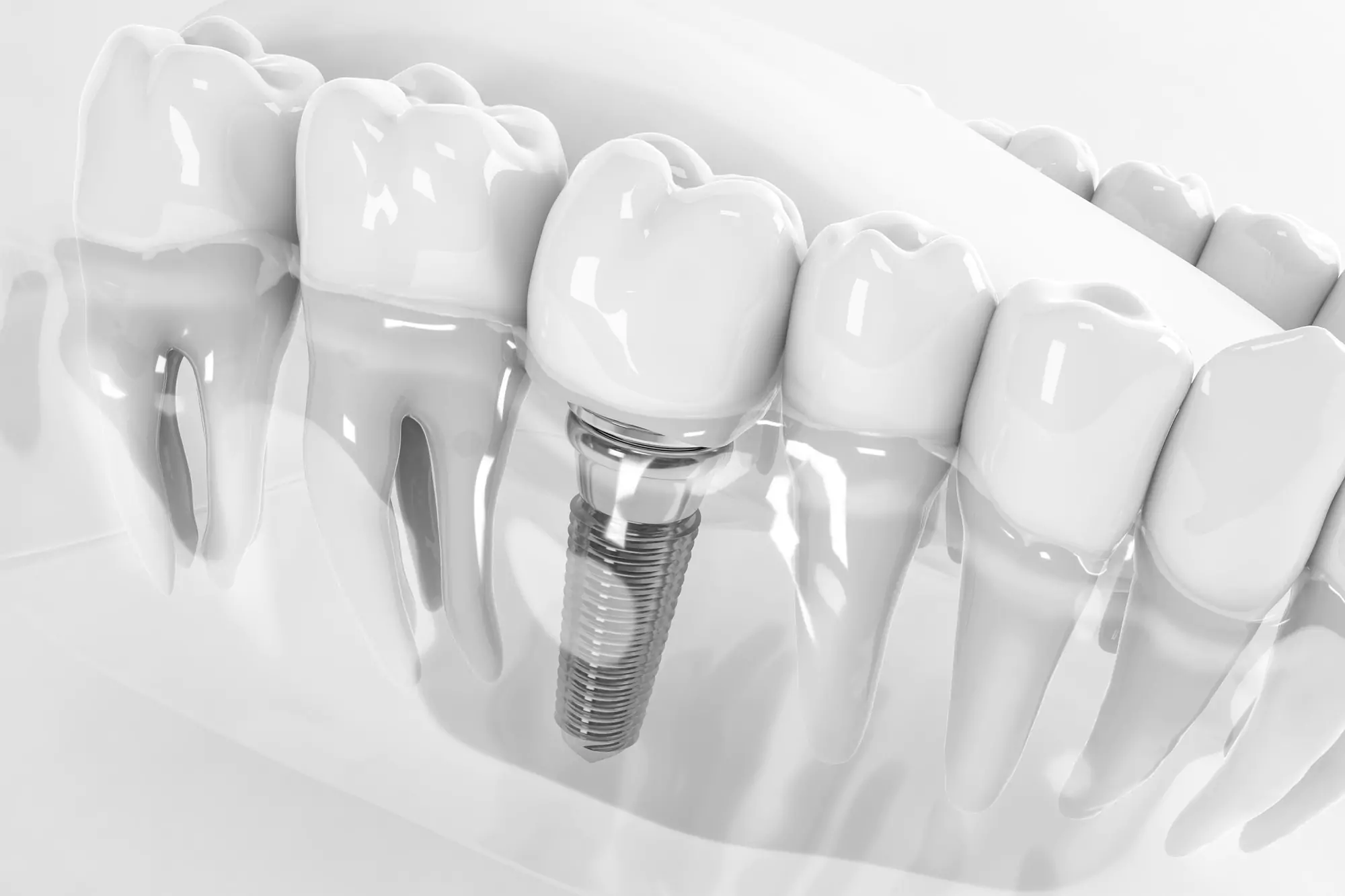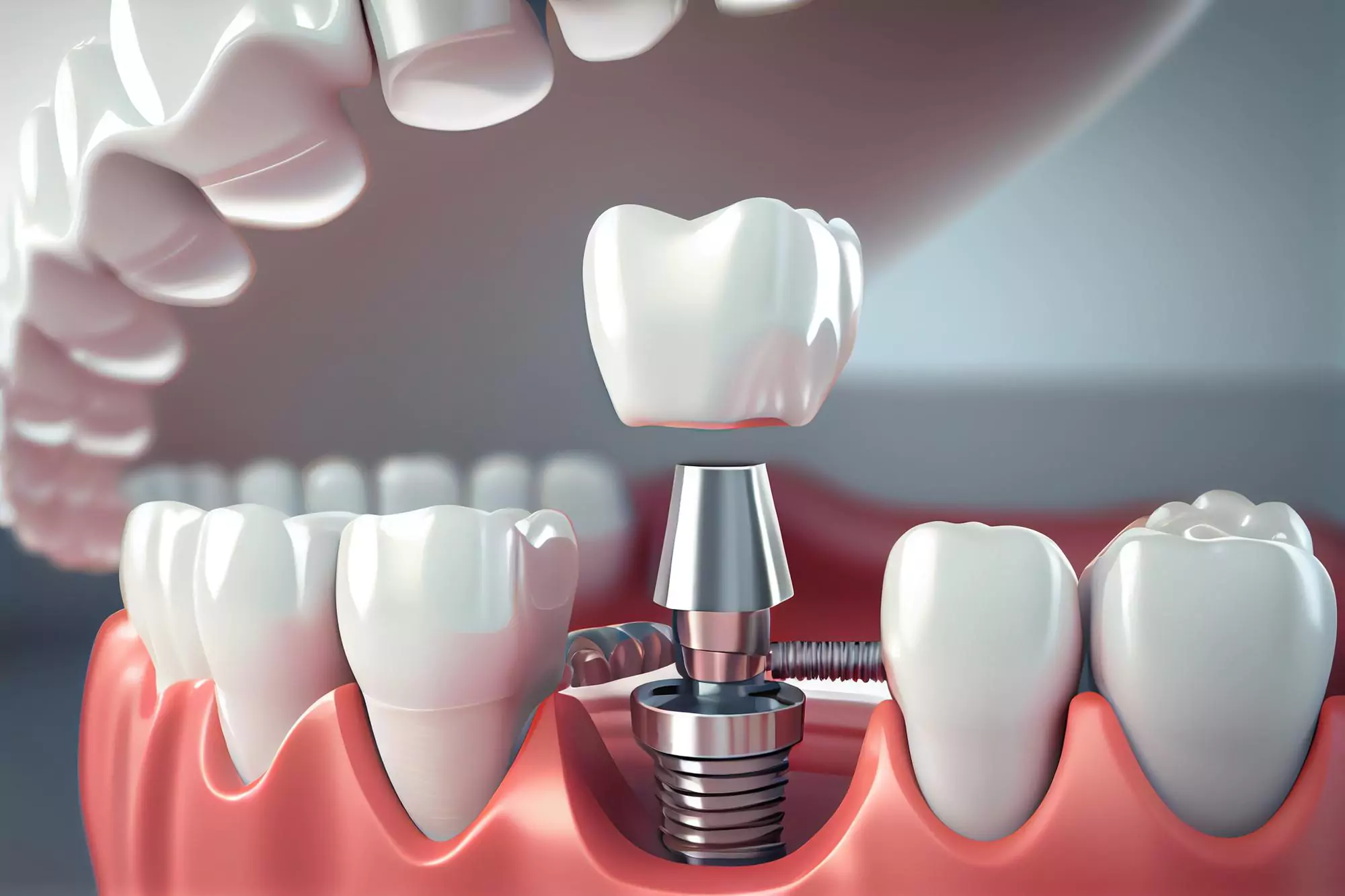
Dental implants are an excellent option for transforming your smile and boosting your confidence. Unlike dentures, which can be prone to slipping and shifting, dental implants provide a permanent and secure solution for replacing missing teeth. Say goodbye to limitations and embrace a new level of self-assurance.
Don’t let dentures hold you back any longer. Dental implants offer a lasting solution, giving you the confidence to speak, laugh, and eat in public without worry. Say farewell to embarrassing slips and shifts that dentures may cause.
Functioning just like natural teeth, dental implants are securely anchored in your jawbone. By replacing missing teeth with implants, you can enjoy improved chewing efficiency and clearer speech, making every meal a satisfying experience.
Choose dental implants for a lifetime of worry-free smiles. With proper care and maintenance, they offer predictable outcomes and prevent bone loss, surpassing the limitations of dentures or bridges. Invest in a lasting solution that will enhance your oral health.
Indistinguishable from natural teeth, dental implants are carefully designed to provide a comfortable and seamless fit. You’ll enjoy the freedom to smile, eat, and engage in social activities without the fear of your teeth holding you back. Rediscover the joy of a perfect smile.
Unlock the ability to eat, chew, smile, and laugh with confidence. Dental implants are widely recognized as the gold standard in tooth replacement, ensuring a flawless and long-lasting result that will enhance your quality of life.
Live life to its fullest potential without the inconvenience of missing teeth or the discomfort of dentures. Say goodbye to limitations and embrace a new chapter of self-assurance. Reclaim your freedom and enjoy every moment with a radiant smile, courtesy of dental implants.
When are dental implants required?
Dental implants are an ideal solution when you have lost one or more teeth due to disease or injury. They can effectively replace missing teeth and address various concerns you may have, such as discomfort with dentures, dissatisfaction with removable dentures, or the
desire to preserve your remaining natural teeth.
Moreover, it is important to replace missing teeth for several reasons:
By understanding the importance of dental implants and their role in addressing various concerns, you can make an informed decision about improving your oral health and achieving a confident smile.
There are various types of dental implants available, and the specific type used will depend on your individual treatment plan. The procedure can be completed in a single day or may take longer, depending on your case. Your dentist will guide you through the process and recommend the most suitable implant type based on your needs and condition.
The dental implantation process typically consists of four core stages, which span over a period of 4 – 6 months:
The dental implant treatment procedure typically includes the following steps:
Regular checkups help ensure the long-term success and longevity of your dental implants.
The cost of dental implants in India generally ranges from $750 to $1250 per dental implant. This cost includes the dental implant surgery as well as the abutment and dental crown.
The cost of a dental implant varies as there are many factors to take into account when it comes to implant treatment, ranging from the brand and type of implants used, the material used in the fabrication of the crowns, dentures or bridges, and whether or not a sinus lift surgery and/or bone graft is required to ensure implant stability after surgery.
Moreover, other factors such as the number of implants in the treatment will also factor additional cost into dental implant cost and the final pricing of the entire procedure. Our team will walk you through your quotation in understanding the process and cost involved for your dental implant treatment.
Speak to us to understand more about dental implants, your suitability for implants and the different types of implant costs associated with your treatment.
Unleash the power of your smile and embark on a life-changing journey today! Embrace a transformational experience that will redefine your confidence and elevate your smile to new heights. Take the first step towards a radiant future and unlock the extraordinary potential within you. Let your smile become the symbol of your transformation and embrace the incredible possibilities that Await.

The price range for a single dental implant is typically between $750 and $1450. It’s important to understand that this cost encompasses the comprehensive process involved in placing a single dental implant, which can be intricate and involve multiple procedures spanning several months to finalise.
Individuals contemplating dental implant surgery can analyse the expenses across two distinct stages: the surgical stage and the restorative stage.
In most cases, patients should not experience significant pain during dental implant surgery, as local anaesthesia is typically administered to ensure comfort.
However, it is important to note that dental surgeons cannot provide an absolute guarantee that the procedure will be completely pain-free for every individual. Rest assured that your dental surgeon will take all necessary measures to ensure your comfort before commencing the procedure.
If you happen to experience any discomfort during the surgery, it is crucial to promptly communicate this to your dentist, as they can administer additional local anaesthetic if required.
In situations where the jawbone is thin or weak, a dental bone graft is often necessary before undergoing a dental implant procedure. This is because the success of dental implants largely depends on their ability to integrate with the surrounding jawbone, a process known as osseointegration.
A bone graft helps in strengthening the jawbone and creating a more solid foundation for the dental implants. The jawbone needs to be strong enough to withstand the significant pressure exerted during chewing. Without a sufficiently strong jawbone, there is a higher risk of implant failure.
After a bone graft, it typically takes several months for the new bone to grow and develop enough strength to effectively support a dental implant. This period of recovery is important to ensure the long-term success of the implant.
Same-day dental implants, also referred to as immediate dental implants, involve the placement of dental implants and the attachment of a dental prosthesis on the same day. This approach is aimed at reducing the overall treatment time for patients.
It is important to note that same-day dental implants are not suitable for all cases. The feasibility of this method depends on various factors and not everyone is a suitable candidate. A thorough evaluation by a dental professional is necessary to determine if a patient is a suitable candidate for same-day dental implants.
Absolutely! Dental implants are commonly used as an excellent option for replacing missing or damaged front teeth. With the expertise of a skilled dental professional, dental implants can offer patients a highly aesthetic outcome that closely resembles a natural tooth.
Typically, the complete dental implant placement process takes around 4 – 6 months to finalise. However, if additional procedures like bone grafts or sinus lifts are necessary, the overall process can extend.
During the initial stage, the implant fixture (a screw-like component) is surgically placed into the jawbone. The area is then stitched up, and a healing period of approximately four to five months follows. This allows for osseointegration, the process of the implant fixture fusing with the surrounding bone.
In the second stage, x-rays are taken to confirm the stability and complete integration of the implant fixture with the bone. Once the dentist determines that the fixture is securely fused, a healing abutment is attached.
At this point, impressions or intraoral scans are taken to create the final restorative crown that will be placed on the implant fixture. After the dental crown is received from the dental lab, a final appointment is scheduled for its placement onto the implant fixture, completing the dental implant process.
It is essential to communicate your concerns and apprehensions about implant treatment with your dentist.
Dental implant procedures often require a longer duration and may involve higher costs compared to other tooth replacement options. However, considering the potential long-term benefits and the likelihood of not needing to replace dental implants throughout your lifetime, they can be a worthwhile investment of both time and money.
Regular dental checkups are crucial to ensure the ongoing health and maintenance of your implants. Your dentist may schedule periodic appointments to monitor the condition of your implants and overall oral health. Following your dentist’s recommendations for routine dental care at home, including regular brushing and flossing, is essential for the longevity of your implants. They may also suggest specific oral hygiene products, such as a specialised mouthwash or toothbrush, to help protect your teeth from cavities and maintain gum health.
If you have any questions about the suitability of dental implants for your specific dental needs, don’t hesitate to seek your dentist’s professional opinion. With proper treatment and oral hygiene practices, dental implants can provide you with a lifetime of healthy smiles.
Not everyone is a suitable candidate for dental implant surgery, as certain criteria must be met before undergoing the procedure. Here are some factors to consider:
It is recommended to consult with your dentist, who will evaluate your specific situation and provide personalised advice regarding your eligibility for dental implant treatment.
Our partnered dental clinics prioritise working with globally recognized dental implant brands to ensure the highest quality of care and convenience for patients. These brands include Osstem, Dentium, Bicon, Straumann, and NobelBiocare. By collaborating with these reputable brands, patients can have peace of mind knowing that their dental implants are sourced from reliable manufacturers with a global presence. This approach ensures that in the event of any emergencies or follow-up procedures, patients can seek assistance from their local dentists without any complications arising from unfamiliar implant brands.
Stay up-to-date with our latest updates!
We will never send any spam emails.
